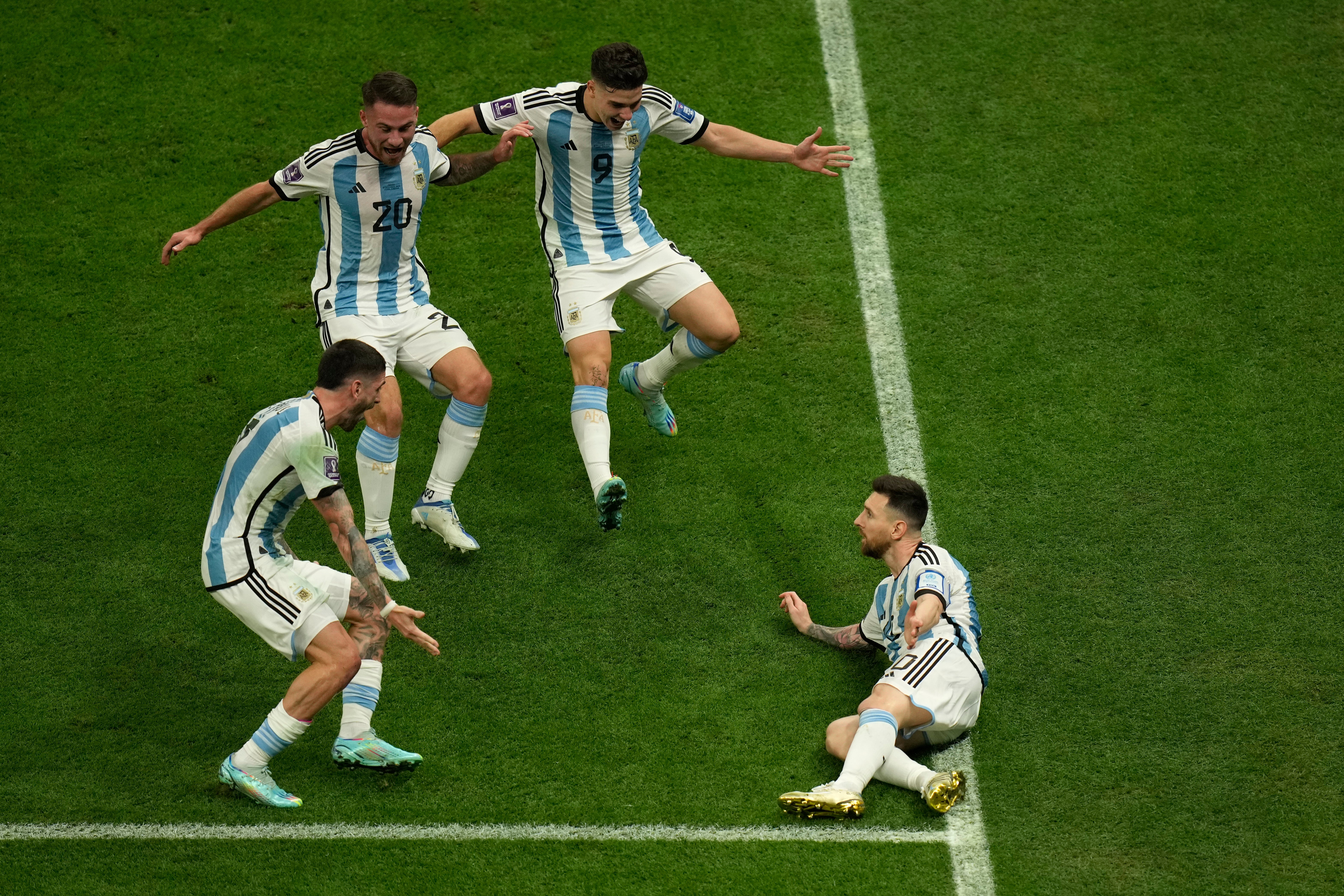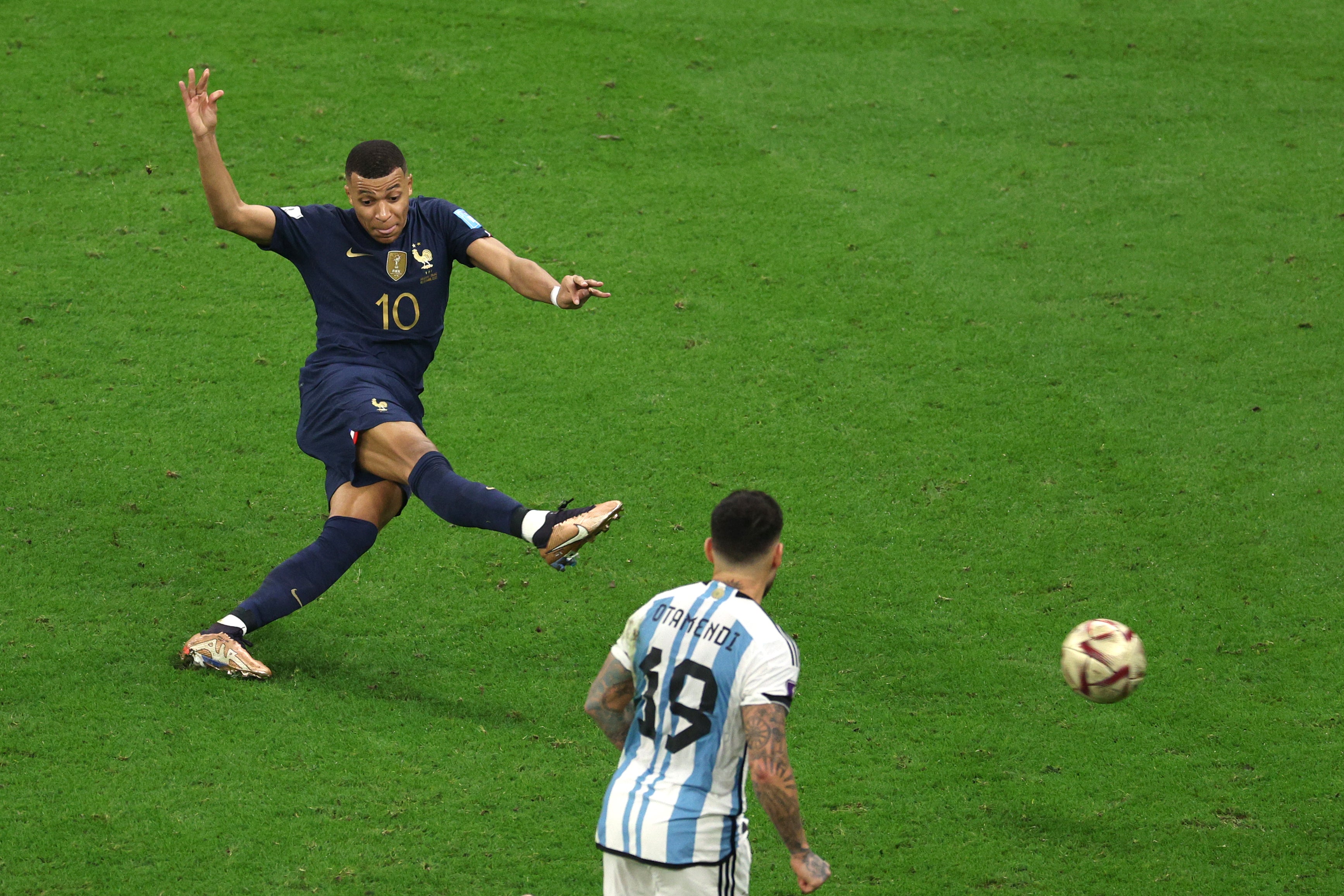
Even a story that felt like destiny had an ending nobody could have expected. Lionel Messi becomes the most beautiful of winners, in the ugliest of settings, and after the greatest of difficulties.
That pristine last fact somehow made it all the more special, only spoke more to the glory of it all. After a game that involved such doubt, that went to levels where we were talking about human spirit let alone sporting spirit, there can be no disputing his legacy.
He has confirmed himself as the greatest player in history, after the greatest final in history, and an occasion that so fittingly had so many historical echoes. Messi at last emulated Diego Maradona as Kylian Mbappe came so close to following Pele, the match itself featuring notes of 1954, 1958, 1966 and 1986. This is 2022, though, and it is Messi’s year; his moment. He has his first World Cup, Argentina have their third, but only after winning this astonishing and incredible final three times.
It was 3-3 and then 4-2 on penalties over France but those are just what goes down in the records. What really should be recounted is the emotion, the dramatics, the theatrics, the release, the image of players going to the absolute limit because this is what the World Cup means.
This went beyond. Games of these stakes almost never go to such states, of emotion, of performance, of ecstacy.
It only went there, however, because Messi’s great successor in Mbappe pushed Argentina that far. He became only the second player in a World Cup final after Geoff Hurst to score a hat-trick, to also beat Messi to the golden boot.
As if he will be bothered by that here, as if it mattered in that moment. Such trials made it better. For Lionel Scaloni’s team to win it the way it had looked like they would for 79 minutes would have been too easy, not epic enough, not fitting the long night of the soul this whole tournament has been. This is why they spoke of the spirit of Maradona and 1986.
France and Didier Deschamps should not go without the greatest praise. They came so close to becoming the first to retain since 1962. Qatar wouldn’t care either way, of course. It didn’t matter who lost, since one of their Paris Saint-Germain stars won. The Lusail is now associated with this in the way the Azteca is associated with Maradona and Pele. The great immorality of this World Cup should not be forgotten amid these figures touching immortality either. How could it be when Messi wore that bisht – something dignitaries wear over a thawb on very formal occasions – in the moment of ascension? It might be fitting for the hosts but was unusual for lifting the trophy. Their calculation has paid off. This shouldn’t be sportswashed. And yet it’s so difficult not to get lost in it all. This is what they were buying.
This was what Argentina almost squandered. Those first 79 minutes now almost feel like a different match, a different world, but they were merely the set-up; the first act for the real story.
While every Argentina action was immediately so certain, so many French touches were off, so many players off-colour. Ousmane Dembele’s first moment of the game was miscontrolling a ball out of play. It was a sign of what was to come.
When Angel Di Maria turned back in with another piercing run down that side, Dembele inexplicably clipped him. Di Maria was by that point the necessary pace to Messi’s poise.
It set his mindset for the first goal of the game, and Messi’s sixth of this World Cup.
The captain this time waited for Hugo Lloris to commit, before just stroking it past him. It had a casual nature that was only emphasised by the deafening show of emotion that followed. Messi slid to the ground in a joyously childlike manner, as the entire Argentina end – and surely the whole country – rose in deafening celebration.

Their team were full value for the lead, and now fully set up to further capitalise. Having previously been based on the counter, the French had to come out, and it meant even more gaps appeared.
It felt like the World Cup itself was there for the taking. Argentina just had to step up. They did exactly that, offering a team goal that is up there with any in the history of this fixture and this competition.
Dayot Upamecano tried to get his side going forward but only gave it straight back to Argentina. You couldn’t say it went straight up to the other end, though, but only because there were so many exquisite angles. It was of course Messi that quickened the pace of the move, and quickened the pulse even in this. As the ball was played up to him in the centre, he fluidly flicked it around the side on the turn for Julian Alvarez to run onto. The pitch just opened up, Alexis Mac Allister sliding Di Maria for a goal that was even more deserved.
That could have been it already for France. Deschamps admitted this by going for something drastic. It was to prove absolutely the correct measure – if somewhat belatedly Dembele and Olivier Giroud were hauled off for Randal Kolo Muani and Marcus Thuram. It was the first time a World Cup finalist had ever made two substitutions before half-time.
Argentina were the first team since the French themselves, in 1998, to be leading by two goals at half-time. The last team to squander a two-goal lead in a World Cup final before this, though? Argentina 1986.
Deschamps’s subs finally had an effect – and what effect, just in time. After so much strange French passiveness, Kolo Muani eventually just went for it. Driving forward in a way that Argentina hadn’t yet faced in this final, Nicolas Otamendi got caught in the manner that had looked likely all tournament. He took Kolo Muani down, the French were back up, and in it.
The transformation was as extreme as it was exhilarating.
It was like stepping up made Mbappe wake up. He powered the ball past Emiliano Martinez. The goalkeeper almost got to it, but was a sign of how France were now always a step ahead. There at this point only looked one winner, let alone an equaliser.
It was another one of those subs who intervened, Thuram laying the ball off for Mbappe to just go with the moment and seize the game. He hit the truest of volleys on the bounce, to fly past Martinez.

After an exhibition, we finally had a football match, and the greatest of finals. It was time for the greatest of players to ascend.
Messi lit the way for Argentina again with one brilliant strike in the final moments of the 90, that would have been the most remarkable way to win a World Cup. There was somehow more to come, though.
There was Upamecano, rectifying his earlier mistake with the most defiant of blocks. Lauturo Martinez should have shot earlier.
He eventually got a shot off that made enough difference. It was his effort that Lloris just about parried, leaving Messi to finish what should have been the winner.
Argentina celebrated as if it was.
That may have been the mistake. Argentina were so close. Too close. Mbappe fired the ball forward, and Nahuel Molina blocked but it was arm was out. He was to have a hand again. There was to be another redemption story.

Mbappe had to keep cool again. He raised the roof again, bringing the fixture to a scale never reached.
There was still an exceptional Martinez save to come and a Martinez miss. You could write an epic on that final minute of the football alone. It was to be another piece of foreshadowing in this grander story.
The game was reaching these narrative stakes. Many might have expected Messi to finally miss after Mbappe scored France’ first in the shootout.
It wasn’t to be a tragedy, though. It was a story that was instead to have everything else.
Messi has completed the game. He has at last fulfilled his career. He has won everything, but this stands above all else.
Messi stands alone. Above the albiceleste, suitably, is only sky.







